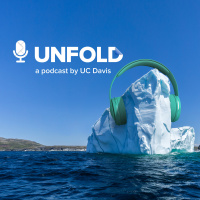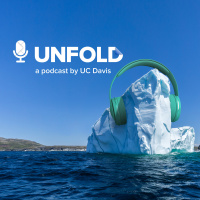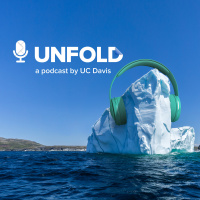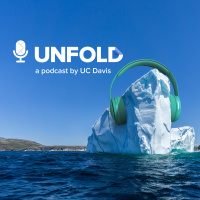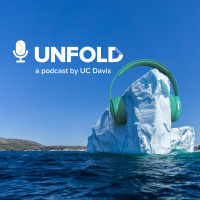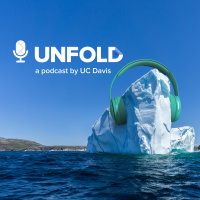Synopsis
Unfold, a podcast that unfolds complicated problems and discusses solutions. Hosted by Amy Quinton and Alexa Renee. Unfold is a UC Davis production.
Episodes
-
Unfold Season 4: Advancing Health Worldwide
30/09/2022 Duration: 02minSeason 4 of Unfold explores the most cutting-edge technologies and treatments that advance the health of both people and animals. Hosts Amy Quinton and Marianne Russ Sharp unfold the story of a courageous couple going through the first human clinical trial that uses surgery and stem cells to treat their developing baby’s spina bifida. You’ll hear how veterinarians and physicians are working together to fight cancer. You’ll learn why amputees often abandon their high-tech prosthetic devices and how surgeons and engineers are working together to solve that problem. You’ll hear lots of remarkable and hopeful stories about health in Season 4 of Unfold.
-
Cockroaches for Dessert
27/09/2022 Duration: 18minJust when you thought Unfold was done for the season, we decided to bug you with one last episode. UC Davis boasts one of the largest insect collections in North America, so how could we not take you on a tour? The Bohart Museum of Entomology holds more than 7 million specimens, from the beautiful to the downright terrifying. Its entomologists have even helped homicide investigations, thanks to the bug scrapings left behind. You’ll hear about beautiful butterflies, jewel beetles, murder hornets and cuckoo wasps — as well as why we’re calling this episode “Cockroaches for Dessert.” In this episode: Lynn Kimsey, professor, UC Davis Department of Entomology and director of Bohart Museum of Entomology
-
The Poet‘s Voice
20/09/2022 Duration: 27minScholars who write about or analyze poetry read out loud usually do so in a subjective and impressionistic way. But UC Davis experts have empirically analyzed the complexities of these vocal performances, based on pitch patterns and speed, volume, pauses, repetition and other characteristics. Now researchers are analyzing the performances of 101 African American women poets. In this episode of Unfold, we discuss why they embarked on the project and what they’ve discovered. In this episode: Marit MacArthur, lecturer with the UC Davis University Writing Program and faculty affiliate with the Performance Studies Graduate Group Howard Rambsy, professor of literature, Southern Illinois University Edwardsville
-
Science of Superheroes
13/09/2022 Duration: 24minIn this episode of Unfold, we mix comic book superhero action and science. No better pairing, since many of the heroes and villains in comics started out as scientists or are connected to scientists. The things they create and the materials they use can tell us a lot about the real world too — everything from physics to engineering. We’ll talk with Ricardo Castro, who teaches engineering students to think outside the box and to contemplate the unlikely, but not always impossible, real-world applications of materials science based on the powers of superheroes. In this episode: Ricardo Castro, associate dean of research and graduate studies, UC Davis Department of Materials Science and Engineering Gary S. May, UC Davis chancellor
-
Chonk the Axolotl: How Life Is Super Amazing
06/09/2022 Duration: 11minIn this episode of Unfold, you’ll hear about Chonk, a pink, baby-faced axolotl who has become a bit of a superstar on Twitter. This fully aquatic salamander is helping developmental biologists understand neural crest cells. These cells help form our face, skin color and peripheral nervous system. Discovering more about these cells can help researchers understand congenital disorders and certain types of cancer. In this episode: Crystal Rogers, assistant professor, UC Davis Department of Anatomy, Physiology, and Cell Biology at the School of Veterinary Medicine
-
*Was* She a Badass?
30/08/2022 Duration: 19minNine thousand years ago, a woman was buried in the Andean mountains of Peru next to tools normally associated with big-game hunting. Before you think she was just a badass, UC Davis researchers found that many females in the early Americas were big-game hunters and we shouldn’t be so quick to project our own gender stereotypes and current cultural values on ancient societies. In this episode of Unfold, we dig a little deeper to learn more about this archaeological discovery. In this episode: Randy Haas, archaeologist and assistant professor, UC Davis Department of Anthropology Monique Borgerhoff Mulder, distinguished research professor emeritus, UC Davis Department of Anthropology Glendon Parker, adjunct associate professor, UC Davis Department of Environmental Toxicology Kim Senklip Harvey, indigenous theorist and cultural evolutionist with the Tsilhqot’in and Syilx nations
-
Nature Tells Its Story, Part 2: Caves and Really Old Water
23/08/2022 Duration: 15minCalifornia boasts hundreds of caves, many of them hidden in the Sierra Nevada foothills. These caves hold much more than beautiful icicle-like stalactites and stalagmites. Trapped inside the stalagmites are tiny droplets of fossilized precipitation from climates long ago. In “Nature Tells Its Story Part 2” of Unfold, UC Davis researchers discuss how these water droplets provide a “climate archive” that may help us predict future shifts in rain, snow and drought. In this episode: Isabel Montañez, distinguished professor, UC Davis Department of Earth and Planetary Sciences Barbara Wortham, doctoral student, UC Davis Department of Earth and Planetary Sciences
-
Nature Tells Its Story, Part 1: Fish Eyes and Ears
16/08/2022 Duration: 13minA fish can’t talk, but its eyes and ears can. Scientists have discovered that each layer of a fish’s lens reveals a different part of its life history, including what it’s eaten throughout its life. While you’ve probably never heard of fish otoliths, these ear bones tell us not only a fish’s age, but what rivers it has traveled. Understanding this could help wildlife managers know what habitats to protect to help imperiled species. In “Nature Tells Its Story Part 1,” Unfold looks at the eyes and ears of fish. In this episode: Miranda Bell Tilcock, assistant specialist researcher, UC Davis Center for Watershed Sciences Carson Jeffres, senior researcher and fish biologist, UC Davis Center for Watershed Sciences
-
Murder, Suicide and the Macabre
26/10/2021 Duration: 20minWe discuss a macabre trend from the 1700s in Germany in this special Halloween episode of Unfold. To avoid eternal damnation for the sin of committing suicide, a number of people began committing child murder so they could be forgiven by a priest before being executed. In this Unfold episode, we look at how imagined child murders can create a culture of actual killings. Warning: this subject matter might not be suitable for all audiences. In this episode: Kathy Stuart, associate professor, UC Davis Department of History
-
Why is that Song Stuck in My Head?
28/09/2021 Duration: 22minEarworm, brainworm, whatever word you choose, it’s that song that gets stuck in your head. Research shows that more than 90% of us experience earworms. UC Davis researchers have found that they may play an important role in helping us form memories, not just for the song, but for life events. In this episode of Unfold, we examine music, memory and what earworms can teach us about how the brain works. In this episode: Petr Janata professor, UC Davis Department of Psychology and Center for Mind and Brain Ben Kubit, postdoctoral researcher, UC Davis Center for Mind and Brain
-
Unfold Season 3: Driven By Curiosity
13/09/2021 Duration: 04minComing Sept. 28, Unfold brings you stories of awe, wonder and discovery as we explore how UC Davis researchers are driven by curiosity. Curiosity can lead to some of the greatest discoveries, like why songs get stuck in your head or what real-world engineering concepts you can learn from comic book superheroes. This season, we examine an archaeological discovery that raises new questions about the sexual division of labor in early hunter-gatherer societies. UC Davis researchers reveal what they found by peeling back the layers of a fish’s eye and by studying cute, pink, baby-faced axolotls. We have lots of surprising and curious stories to tell this season — even a spooky, dark and murderous one, just in time for Halloween.
-
How Climate Change is Punishing the World's Poor
17/11/2020 Duration: 28minUnfold travels to Kenya, where climate change is threatening a way of life for pastoralists. Climate change is driving families deeper into poverty. When drought hits, men travel for weeks in search of water and greener pastures for their livestock herds. The women and children are left behind with no stable source of food or income. UC Davis agricultural economists are researching the pairing of two intervention programs, including a type of climate insurance policy, to keep these vulnerable populations from falling so deep into poverty that they have no way to recover. In this episode: Michael Carter, professor of agricultural and resource economics, and director of the Feed the Future Innovation Lab for Markets, Risk and Resilience at UC Davis, with research in Kenya funded by USAID.Tom Lenaruti, Project Coordinator, BOMA ProjectNathan Jenson, economist at the International Livestock Research Institute
-
Transitioning to Low-Carbon Transportation
10/11/2020 Duration: 24minIn California, 40 percent of greenhouse gas emissions comes from transportation. Emissions from this sector will make it difficult to meet the state’s 2030 climate goals. There is a myriad of solutions: electric vehicles, public transportation, ride share, e-scooters and more. But people’s behaviors and habits as well as bad land-use planning make this one of the most difficult sectors to decarbonize. In this episode of Unfold, we’ll look at how we can transition to low-carbon transportation.In this episode:Giovanni Circella, Director of 3 Revolutions Future Mobility Program, Institute of Transportation Studies at UC DavisLew Fulton, Sustainable Transportation Energy Pathways Program Director, Institute of Transportation Studies at UC DavisDan Sperling, founding Director of the Institute of Transportation Studies and California Air Resources Board Member
-
Bonus: Decarbonizing Energy
03/11/2020 Duration: 11minA quarter of the world’s greenhouse gas emissions comes from heating and electricity. In this episode of Unfold, we talk with Alissa Kendall, professor in the Department of Civil and Environmental Engineering about our energy use. We’ll discuss renewable energy and other decarbonizing technologies and the importance of life-cycle analysis when discussing climate change solutions.In this episode:Alissa Kendall, professor, Department of Civil and Environmental Engineering
-
Oceans Under a Changing Climate
27/10/2020 Duration: 16minOceans have always done us a favor, absorbing carbon dioxide in the atmosphere. But now rising greenhouse gases are warming the ocean and changing its chemistry. All of this is putting marine species and ecosystems at risk, threatening food security and the livelihoods of people along its shores. In this episode of Unfold, we’ll take a deep dive into the ocean to examine the effects of climate change. In this episode:Priya Shukla, Ph.D. student at Bodega Marine Laboratory, Department of Environmental Science and PolicyTessa Hill, professor and oceanographer, Bodega Marine Laboratory.
-
Rock Dust: A Climate Change Solution
20/10/2020 Duration: 17minAgriculture is responsible for 24 percent of our global greenhouse gas emissions. Despite this, UC Davis researchers say agriculture holds huge potential to be one of the biggest solutions to climate change. Carbon farming may hold the key. In this episode of Unfold, we examine how scientists are adding rock dust to crops to see if it can sequester carbon while also increasing yields for farmers.In this episode:Ben Houlton, affiliate faculty member, former director of the John Muir Institute of the Environment at UC DavisMaya Almaraz, program manager in the Houlton Lab and terrestrial biochemistIris Holzer, graduate student in the Houlton LabDerek Azevedo, executive vice president, Bowles Farming Company in Los Banos, CaliforniaGeorge Dias, Specialty Granules in Ione, California
-
Bonus: E-Commerce and Climate Change
13/10/2020 Duration: 11minIt’s so easy. One click of your mouse and you’ve ordered just what you want, delivered to your doorstep in just a few days or even a few hours. Since COVID-19, our online shopping habits, particularly all those groceries, have increased dramatically. What that has meant for our carbon footprint might just surprise you. Miguel Jaller with the UC Davis Institute of Transportation Studies will unfold all the complexities of e-commerce in this brief bonus episode of Unfold.In this episode:Miguel Jaller, Co-director of the Sustainable Freight Research Center at the UC Davis Institute of Transportation Studies
-
Hotter, Drier, Windier: California Wildfires Under a Changing Climate
06/10/2020 Duration: 24minCalifornia wildfires burned millions of acres this year, destroying entire towns and killing people. As wildfires become more difficult to control and more deadly, scientists say it will only get worse. Now, wind-driven wildfires like the Santa Anas that Southern California experiences, are moving further north and striking when conditions are hotter and drier. This episode of Unfold examines how fire is changing California’s landscapes and how we might manage this going forward.
-
Becoming Arizona
29/09/2020 Duration: 20minBy 2100, Sacramento is expected to feel much like Phoenix, which last year had more than 100 days over 100 F. In this Unfold episode, co-host Kat Kerlin discusses her “Becoming Arizona” series, which looks at how to prepare for a hotter future. We also examine how cities nationwide are dealing with triple threats: rising temperatures, racial inequities and a pandemic. And we’ll discuss the efforts needed to build socially just, climate-resilient communities.In this episode:Mary Cadenasso, professor, and landscape and urban ecologist at UC DavisStephen Wheeler, professor of landscape architecture and urban design at UC DavisHelene Margolis, associate adjunct professor in the Department of Internal Medicine, UC Davis School of MedicineAdrienne Lawson, senior director for the UC Davis Office for Health Equity, Diversity and InclusionVictoria Dearborn, graduate student in the Cadenasso Landscape and Urban Ecology LabVictoria Vasquez, South Sacramento NeighborWoods organizer, Sacramento Tree Foundation
-
Climate Change and COVID-19
22/09/2020 Duration: 24minThe coronavirus pandemic stay-at-home orders and lockdowns resulted in a huge drop in global greenhouse gas emissions — the largest reductions since World War II. The reductions were short-lived as the U.S. and other countries opened back up, but there are lessons we can take away from the pandemic about global climate change and how we’re handling both crises. In this episode of Unfold, we look at surprising similarities between the climate crisis and the coronavirus pandemic. In this episode:Fraser Shilling, co-director, Road Ecology Center at UC DavisBen Houlton, affiliate faculty member, former director of the John Muir Institute of the Environment at UC DavisHelene Margolis, associate adjunct professor in the Department of Internal Medicine, UC Davis School of MedicineTracey Goldstein, associate director, One Health Institute at UC Davis


